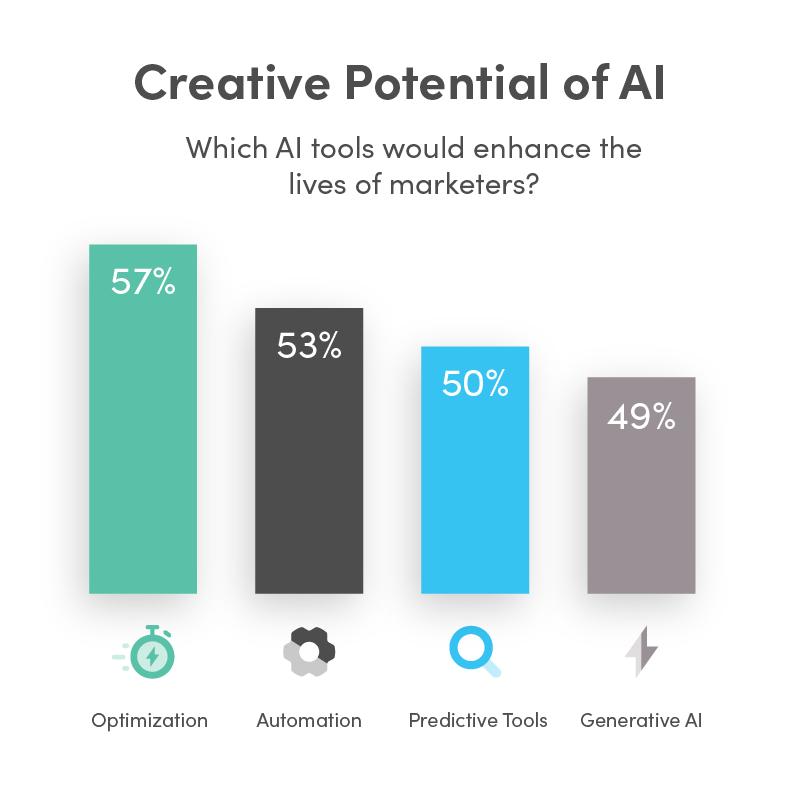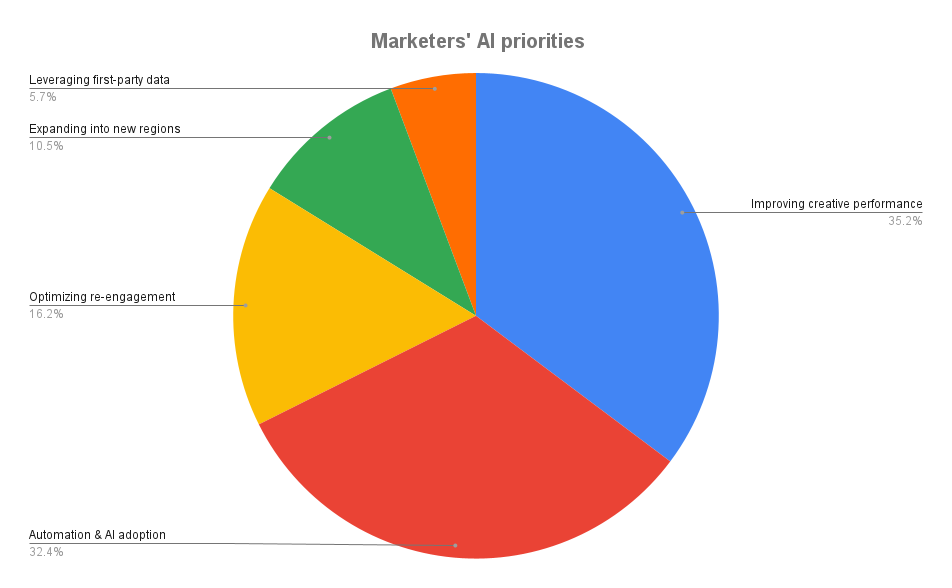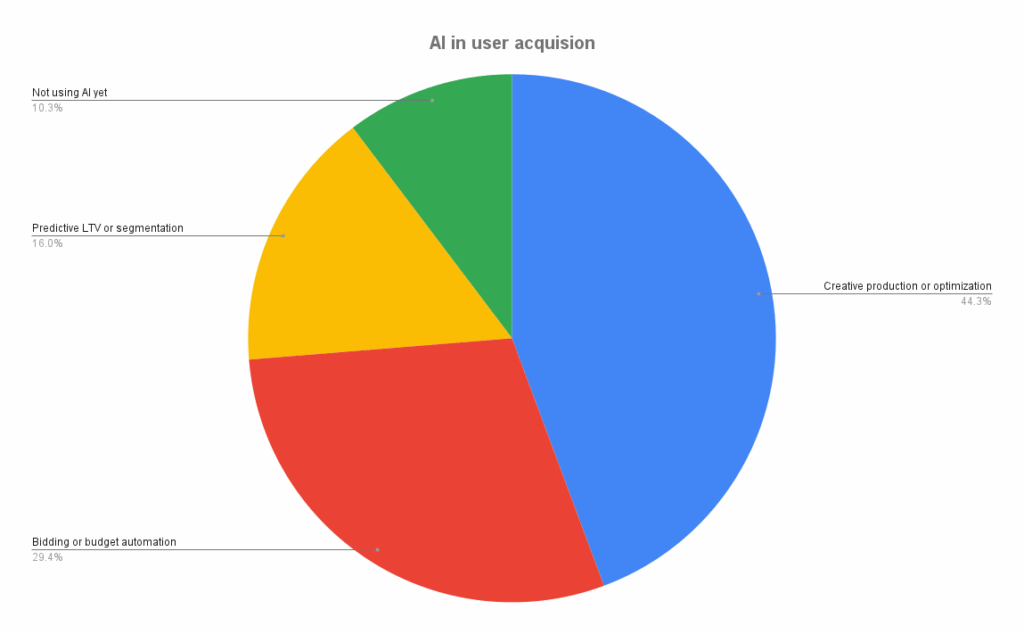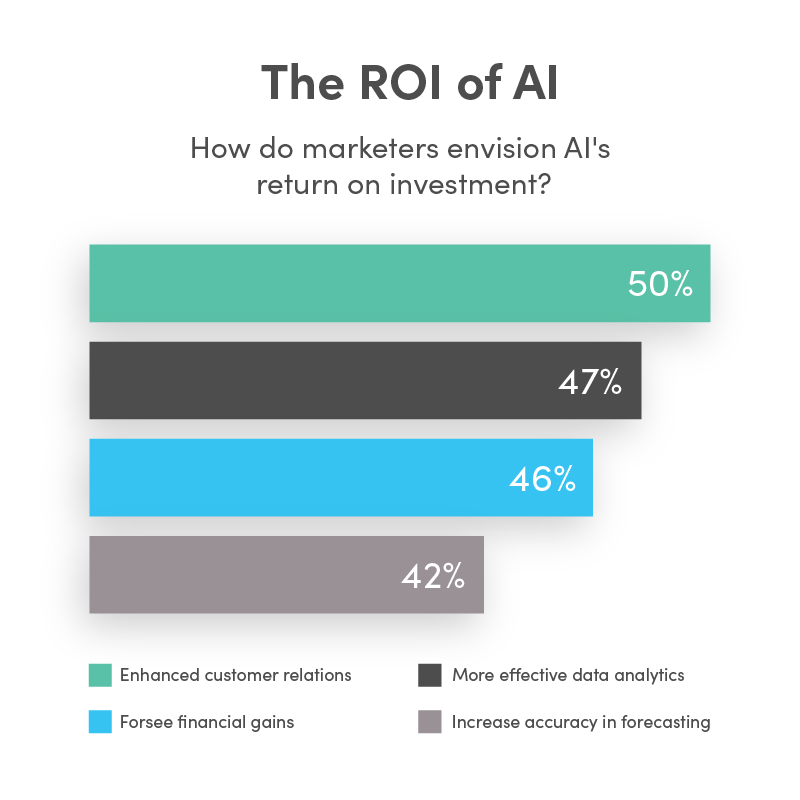AI marketing: 99% of marketers are using AI … here’s what they’re doing
A study on AI and marketing commissioned by Iterable says that almost every single marketer uses AI every single day. As in literally 99% using AI in some way every day for at least something, while a still-staggering 91% are using AI for their jobs daily. And three quarters of marketers are optimistic that AI marketing tools will create new jobs as well as unlock new opportunities for growth.
Iterable talked to 1,200 marketers in the U.S., UK, Netherlands, and Germany.
Marketers and AI: what are they using?
Interestingly, according to the study of 1,200 marketers, generative AI, the noisiest and most-hyped application of artificial intelligence at the moment, has some work to do. 57% say that AI marketing tools enhance optimization, 53% say automation is the best use, and 50% look to AI marketing tools for predictive analytics.
(Maybe these marketers have tried to get text into generative AI images and failed.)
But, 49% say that generative AI tools enhance their working lives.

However, half of marketers find AI intimidating, and 54% say the existence of AI marketing tools is heightening expectations from managers. And most feel they don’t have all the skills and knowledge they need to use AI effectively.
- 49%: AI is intimidating
- 54%: AI increases expectations
- 89%: AI requires new skills, which is somewhat concerning
- 29%: AI requires new skills, which is extremely concerning
Not surprisingly, less than half of marketers have been trained on AI marketing skills.
That fully accords with my personal experience, which is based on personal dabbling with OpenAI, Creative Diffusion, MidJourney, Dall-E, and multiple other tools, but no formal training. (Of course, so many of the new AI tools have become available so recently that it’s almost impossible for training developers and programs to keep pace.)
AI marketing: what we’re seeing at Singular
Singular now has a lot of first-party data on how marketers use AI, because we’re incorporating artificial intelligence throughout our product suite.
- Our new AI-powered marketing insights is in HEAVY use with almost instant uptake
- And Creative IQ is providing almost instant AI-powered creative optimization insights
What we’re seeing in both tools is that marketers want better insight, faster, and easier, with AI. Marketers have gigabytes of data: they are not low on data. What they need is for that data to make sense, and AI can help there.
In our recent State of User Acquisition webinar, we asked marketers: what is your top priority with AI?
Here’s what they said:
- 37%: Improving creative performance
- 34%: Automation
- 17%: Optimizing re-engagement
- 11%: Expanding into new regions
- 6%: Leveraging first-party data

We also asked marketers about their top AI use cases for user acquisition specifically. Here’s what they said (they could select any or all answers that applied to their particular circumstances):
- 86%: Creative production or optimization
- 57%: Bidding or budget automation
- 31%: Predictive LTV or segmentation
- 20%: Not using AI yet

So what we’re seeing is that creative is king. A massive 86% of marketers using AI say they apply it to creative production or optimization. In other words, AI is now a core tool for accelerating creative production and testing. But predictive analytics is still not mainstream, and only about half of marketers are using AI in bidding and budgeting optimization.
AI marketing: what’s happening?
There’s obviously a lot going on in generative AI and marketing. Here’s just a few of the recent developments that we’ve talked about on the Singular blog:
- Google’s Performance Max adds generative AI for ads
- Generative AI will double or triple the size of the gaming industry
- 10 things digital marketers are doing with generative AI right now
- 10 generative AI tools for app growth
Back to the study: AI marketing and ROI
One place where there isn’t clarity among marketers, however, is whether AI marketing tools are generating a positive return on investment. Or how they will do so in the future.
I’d assume that increased efficiency in what you’re already doing and increased capacity to do more things than you previously could are both indicative of positive ROI, but the survey focused on where AI will most likely benefit marketing organizations.

50% say ROI will come from better customer service — think users or players in a mobile app — while 47% say more effective analytics will be where AI marketing tools generate ROI. Slightly lower numbers see other areas of analytics as top priorities as well: predictive analytics for revenue and forecasting.
What marketers want from AI
According to the 1,200 marketers surveyed, 39% of marketers want AI marketing tools to enhance their creativity. 37% want AI to do part of their jobs so they have “more free time for fulfilling tasks,” and 37% want to feel tech savvy.
Almost a third are looking for AI to reduce their stress levels as well.
What pretty much everyone agrees is that we haven’t tapped AI’s full potential yet.
“While many marketers have embraced AI, they haven’t yet tapped its full potential. AI offers an incredible opportunity to liberate marketers from operational minutiae and tasks like data analysis and content creation,” said Adriana Gil Miner, Chief Marketing Officer of Iterable. “This frees them up to focus on creativity and crafting unique experiences that bring joy to customers. AI isn’t just about automation; it’s about elevation, unleashing creativity, and amplifying brand voices.
I buy some of that, but not all of it.
Muddling in the data sometimes feels like drudgery (ok, almost always) but often brings eureka! moments when you find something unexpected. AI marketing tools can do that too, but not always. And you do have to double-check AI’s answers in data as well as text, since AI hallucinations are not yet a thing of the past.
Also, for writing — yeah, that thing I’m doing right now — AI-created content can be pretty basic, a bit meh, and fairly surface. That said, it can be a great starting point for the addition of human insights, creativity, and tone.
Miner agrees:
“The future of marketing lies not in replacing human ingenuity, but in using AI to empower it.”
At least, that’s what I’m telling the Terminator. And any AI marketing tools I use.
And myself, of course.
Stay up to date on the latest happenings in digital marketing


